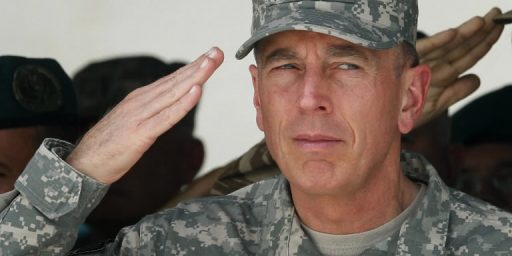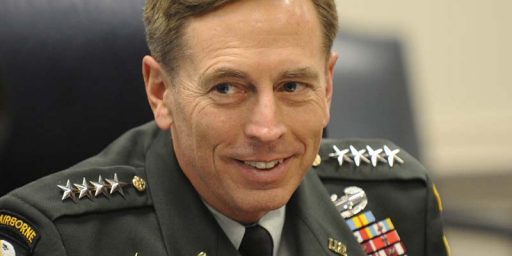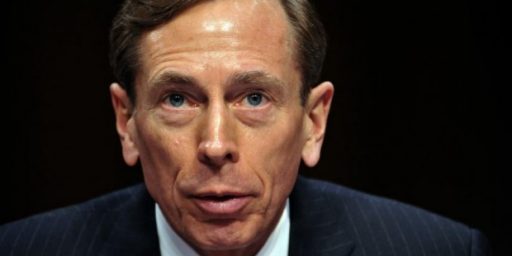Petraeus Next NATO Chief?
One of my Atlantic Council colleagues forwards a report that David Petraeus is being considered for the Supreme Allied Commander post.
A senior Pentagon official said that it was weighing “a next assignment for Petraeus” and that the NATO post was a possibility. “He deserves one and that has also always been a highly prestigious position,” the official said. “So he is a candidate for that job, but there have been no final decisions and nothing on the timing.”
[…]
If General Petraeus is shifted from the post as top Iraq commander, two leading candidates to replace him are Lt. Gen. Stanley A. McChrystal, who is running the classified Special Operations activities in Iraq, and Lt. Gen. Peter W. Chiarelli, a former second-ranking commander in Iraq and Defense Secretary Robert M. Gates’s senior military assistant.
By this fall, General Petraeus would have served 19 months in command in Iraq and would have accumulated more than 47 months of service in Iraq in three tours there since 2003. In the NATO job, General Petraeus would play a major role in shaping the cold-war-era alliance’s identity, in coping with an increasingly assertive Russia and in overseeing the allied-led mission in Afghanistan.
General Petraeus, 55, has been criticized by Democratic lawmakers opposed to Mr. Bush’s decision to send additional combat forces to Iraq. A NATO post would give him additional command experience in an important but less politically contentious region, potentially positioning him as a strong candidate in a few years to serve as chairman of the Joint Chiefs of Staff, several military officials said. They and some others who discussed the potential appointment declined to be identified because they were speaking about an internal personnel matter.
Some experts, however, say General Petraeus’s departure would jeopardize American efforts in Iraq, especially since the No. 2 officer in Iraq, Lt. Gen. Raymond T. Odierno, is scheduled to complete his tour and leave Iraq in mid-February. General Petraeus “should stay at least through this year,” said Anthony Cordesman, a military specialist at the Center for Strategic and International Studies. “We really need military continuity in command during this period in which we can find out whether we can transition from tactical victory to some form of political accommodation. “We have in Petraeus and Crocker the first effective civil-military partners we have had in this war,” Mr. Cordesman added, referring to Ryan C. Crocker, the United States ambassador in Baghdad. Gen. George W. Casey Jr., General Petraeus’s predecessor, served nearly three years in the top Iraq job before becoming Army chief of staff.
There has been speculation that General Petraeus’s next post might be as head of the Central Command, which has responsibility for the Middle East region. That would enable him to continue to influence events in Iraq while overseeing the military operation in Afghanistan and developing a strategy to deal with Iran. The Central Command post is currently held by Adm. William J. Fallon. Admiral Fallon, through a spokesman, denied that he intended to retire from the military in the next several months.
The NATO post has long been considered the most important of the combatant commands. Shifting Petraeus, the star American flag officer, to that assignment would signal the importance we place on the Alliance at a time when many are questioning its effectiveness as a collective defense regime. (See, for example, Stanley Kober and Pat Lang.) It might help refocus our attention on Afghanistan, which is arguably the most important conflict in which we’re engaged.
At the same time, I agree with Cordesman that we need continuity in Iraq. Despite crowing from some that the Surge has worked, we’re a long way from victory there and we have a lot riding on it. Constantly playing musical chairs with our leadership team has been one of the key mistakes and it’s not one we should compound. Kicking Petraeus upstairs to CENTCOM would be the better move if rotation of commanders is deemed necessary.






This is an admission of failure. NATO generals do nothing other than sit around Berlin and drink schnapps.
This plan sounds positively Clinton-esque If Patraeus leaves Iraq the terrorists will prevail. He is the only one holding things together down there.
Berlin? More like drinking good Belgian beer in Mons.
They could always bump McMaster however many paygrades it takes and let him have MNF-I. Let the deskflying types scream all they want. After all, a lot of what Saint Pet is getting credit for is what McMaster pioneered at Tal Afar. He’s popular with his troops and has been a major member of Pet’s staff all through the Surge.
Regards, C
Isn’t the scuttlebutt that Fallon and Petraeus seriously disagree about troop levels in Iraq; ie Petraeus wants to delay post-surge draw-downs while Fallon wants them to proceed on schedule. In that sense, then, the promotion could be looked at as sidelining a gadfly.
From the NYT article: “The Pentagon is considering Gen. David H. Petraeus for the top NATO command later this year…” and “…said Gen. Joseph W. Ralston, who served as NATO commander at the time and has since retired.”
MSM is still getting it wrong with military positions, I see.
See http://www.nato.int/structur/structure.htm to learn how Petraeus or any other would never be in the “top NATO command.”
Here’s how it works:
The North Atlantic Council provides guidance to the NATO Military Committee. The “MC” is the highest military authority in NATO, and provides strategic guidance to ACO and ACT. GEN Petraeus would run ACO and report to the MC in his NATO role, and to the CJCS in his commander, EUCOM role.
The MC consists of chiefs of staff of member nations (in CS status); the committee is led by a Chairman, who is never American and has a Deputy Chairman, who has always been American. In PS status, it consists of military representatives at the 3-star rank.
Things are going to get worse in Iraq as the surge draws down in the next two months. I can’t help but wonder if this is an attempt to get Petraeus out of the (political) line of fire. That way later they can blame the inevitable decline on him being promoted.
“Things are going to get worse in Iraq as the surge draws down in the next two months. I can’t help but wonder if this is an attempt to get Petraeus out of the (political) line of fire. That way later they can blame the inevitable decline on him being promoted.”
Posted by Tlaloc
That’s my opinion; I was looking for something like this for a while. The whole point of the surge, IMHO, was to ‘kick the can’ down the road a year. After the ’06 election, Bush couldn’t just ‘stay the course’, and he didn’t want to withdraw troops. So he came up with The Surge. It successfully bought a year, but ain’t gonna win the war.
Petraeus, of course, knows this. If the war could be won, don’t you think that he’d stay to win it? Or at least until it was absolutely clear that we were winning it, and only the ‘clean up’ work needed to be done?